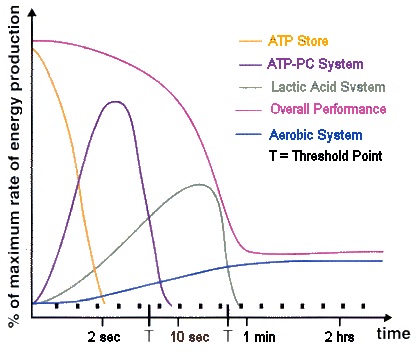Wij gebruiken cookies om uw ervaring beter te maken. Om te voldoen aan de cookie wetgeving, vragen we uw toestemming om de cookies te plaatsen. Meer informatie.

Get up to 19 point(s) for purchase! Login to see an actual value.
Beta-alanine is a naturally occurring beta amino acid that is produced in the liver.⁽¹⁾ It has been identified as the precursor to carnosine synthesis⁽²⁾⁽³⁾, which means that beta-alanine functions as a lactic acid buffer as it can increase carnosine concentrations in the muscles. Increased concentrations of carnosine allow a number of biochemical mechanisms to postpone muscle fatigue in an efficient way.⁽⁴⁾⁽⁵⁾ It also has positive effects on the explosive and peak power during long physical efforts, and it increases training capacity and energy levels.⁽⁶⁾⁽⁷⁾⁽⁸⁾
Suited for:
Athletics
Rugby / Soccer
Swimming / Rowing
Basketball
Martial Arts / MMA / Boxing
Cycling
1 serving = Mix ½ scoop (2.5g) with 250ml of water or your favourite sports drink.
On Training Days: take 1 serving with breakfast or lunch and 1 serving 20 minutes before your training.
On Non-Training Days: take 1 serving with breakfast or lunch.
Take for a period of 10 – 12 weeks to achieve maximum results.
Beta-Alanine can cause mild tingling (paresthesia), which is temporary and harmless.
Beta-alanine
How does Beta-alanine work?
Creatine is primarily involved in muscle contraction and works on the ATP-CP Energy System. Once the Creatine Phosphate stores are depleted, the body mainly uses glucose as an energy source. The breakdown of glucose or glycogen during high intensity exercise results in the production of lactate and hydrogen ions (Lactic Acid System, see Figure 1). The accumulation of hydrogen ions is the cause of muscle acidification. The body can buffer these ions to a certain extent with the help of carnosine. But as the training continues, the levels of carnosine are not sufficient enough anymore, which leads to muscle fatigue and decrease in strength. Beta-alanine supplementation increases carnosine concentrations in muscle tissue.

Figure 1: Energy pathways⁽⁹⁾⁽¹⁰⁾
Beta-alanine is a non-essential amino acid that together with the amino acid L-Histidine produces Carnosine. The body usually has enough L-Histidine, but beta-alanine needs to be taken from nutrition. Beta-alanine can be found in poultry, fish and meat, but only in low concentrations and therefore needs to be supplemented to increase carnosine concentrations.
In many sport disciplines the body doesn’t only use one, but multiple energy systems. It depends on the intensity and the duration of the activity. Beta Alanine is very efficient for sustained high intensity efforts starting from 30 seconds up to 4 minutes. To optimize the use of the different energy systems, beta-alanine is often combined with creatine. This combination is more efficient on strength performance than creatine alone.⁽¹¹⁾
|
Ingredients |
Per 100g |
Per 5g |
|
Beta-alanine |
100g |
5g |
Beta-Alanine, Anti-Caking Agent (Silicon Dioxide)
Eric T. Trexler et al. International society of sports nutrition position stand: Beta-Alanine. J Int Soc Sports Nutr. 2015;12:30.
Harris RC et al. The absorption of orally supplied beta-alanine and its effect on muscle carnosine synthesis in human vastus lateralis. Amino Acids. 2006;30(3):279–89.
Dunnett M, Harris RC. Influence of oral beta-alanine and L-histidine supplementation on the carnosine content of the gluteus medius. Equine Vet J Suppl. 1999;30:499–504.
Hill CA et al. Influence of beta-alanine supplementation on skeletal muscle carnosine concentrations and high intensity cycling capacity. Amino Acids. 2007 Feb;32(2):225-33.
Baguet A et al. Important role of muscle carnosine in rowing performance. J Appl Physiol (1985). 2010 Oct;109(4):1096-101.
Saunders B et al. Beta alanine supplementation to improve exercise capacity and performance: a systematic review and meta-analysis. Br J Sports Med. 2017 Apr;51(8):658-669.
De Salles Painelli V et al. Influence of training status on high-intensity intermittent performance in response to β-alanine supplementation. Amino Acids. 2014 May;46(5):1207-15.
Glenn JM et al. Incremental effects of 28 days of beta-alanine supplementation on high-intensity cycling performance and blood lactate in masters female cyclists. Amino Acids. 2015 Dec;47(12):2593-600.
Mathews DK J et al. The Physiological Basis of Physical Education and Athletics. Philadelphia: Saunders, 1976.
MacKenzie, B. Energy Pathways. 1998. Available from www.brianmac.co.uk/energy.htm
Hoffman J et al. Effect of creatine and beta-alanine supplementation on performance and endocrine responses in strength/power athletes. Int J Sport Nutr Exerc Metab. 2006 Aug;16(4):430-46.